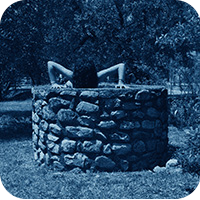Day of the Lucani
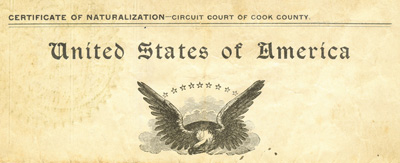
Sunday May 20 was The Day of the Lucani when Italy celebrates all those of Basilicatan descent wherever they may live. Now, references to this “holiday” are mighty scarce and not altogether consistent, but the Internet says it exists. And I believe everything the Internet tells me.
In a stunning coincidence the day truly was of the Lucani for my parents and I. We set about a trek around the Chicago area to talk to older relatives on the Tolva side and to pilfer through their photos and documents. It was depressing in a way, because talking to these few living family members reminded us that we’d already lost the majority of the family history. There’s no one on that side alive from my grandparents’ generation. Why do you only become interested in genealogy once your primary sources are gone?
But memories remain and what we found is that sometimes those memories aren’t rosy. There’s a tendency — OK, I have a tendency — to romanticize the past and ancestors. Giuseppe Tolve, my great-grandpa and the man who came to America from Italy with his wife Grazia, has reached almost heroic status in my mind, for instance. But it turns out he was not what you’d call a great husband.
We’d long known that Grace died in childbirth with my great-uncle Paulie in 1920. However, the story of her burial were made clear to us this last weekend. The Botte family would not bury Grace in the plots owned by Giuseppe because of how he treated her during her life (details are sketchy, but the word “conniver” was tossed about — most think he was a philandering drunk). They buried her under her maiden name in the Botte plot. Ouch.
Decades later when my great-uncle Bill was near death he asked Paulie to donate his body to science. Paulie made some inquiries and was told that he would need to make backup arrangements in case science did not want Bill’s body. So, he thought, we can just use the empty plot next to Giuseppe, since Grace was never buried there. When Paulie contacted the cemetary he was told that this was not possible since “Mrs. Tolva” was buried right next to Giuseppe. But Paulie knew for a fact that Grace Botte was not buried with him. It turns out that one of Giuseppe’s girlfriends (perhaps a barmaid, perhaps someone he legally married) indeed occupied the original plot for Grace. Double ouch!
Also, we learned that the four (of seven) children young enough to be placed in an orphanage earned the nickname there “Boozy Tolvas” because whenever Giuseppe came to visit he was drunk.
Ah, family history. I suppose if you dig you have to be prepared for dirt.
But there were also gems. Such as locating the original naturalization document for Giuseppe from 1904. This is step one in determining our eligibility for dual citizenship with Italy. What we need to determine is if the line “renouncing and abjuring all foreign allegiance …” is the same as officially renouncing one’s citizenship. If so, we’re hosed. If not, I may be on my way to EU citizenship. Any lawyers out there deal with this sort of thing?

A different kind of Basilicatan homecoming
So what’s the relationship like between the north and the south in Italy? In many ways it is similar to 19th century America where an industrialized, urbane north interacts with a rural, agrarian south. Yet, as in the American case, that’s a gross simplification. Being independent states and kingdoms for most of their history, the individual regions of Italy have a much more complex relationship to one another than American states have ever had.
We need look only to current events for an example. Basilicata was recently in the news regarding the bizarre tale of a would-be assassin and the lingering effects of regional tension.
Giovanni Passannante, a native of Salvia, Basilicata, tried to kill King Umberto I of Italy 120 years ago. He failed, was jailed, and went insane. As further punishment, the kingdom of Italy forced his hometown to rename itself. You will find Salvia listed on maps today as Savoia di Lucania (Umberto was of the house of Savoy). But it didn’t end there. Passannante’s skull and brain were removed and preserved in formaldehyde for study by criminologists. They’ve been on display in a museum in Rome for the last 70 years.
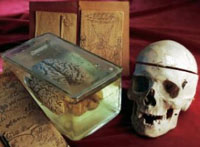
That is, until last week when the remains were to be publicly removed and interred with the rest of the body in a full ceremony in Basilicata. But that’s not what happened. A day earlier than planned officials squirreled the remains away secretly to bury them with no fanfare. Certain activists, especially in the south, are upset.
“No one wanted to deal with this case,” said Vito De Filippo, president of the Basilicata region. “No one had it in mind to confront this problem.”
Others see nefarious forces at work. Pesce lays the blame directly at the feet of the current mayor of Lucania, Rosina Ricciardi, who he claims was under pressure from traditionalists in the region to delay the burial and who he says had hoped to put Passannante’s remains once again on display, but this time in Lucania.
“In Italy there is a strong monarchical movement that should not be underestimated even though it seems ridiculous,” Pesce said. Repeated calls to Ricciardi’s office seeking comment were not returned.
De Filippo sees a parable in what could be the end of this long tale. “Passannante is a symbol of the south, and while everything is not resolved and the south still has many problems, we have the civility to close this story, by bringing him home.”
Full story: Dead anarchist becomes cause célèbre in Italy. Ironically, friends in Italy tell me that this story is not receiving nearly the coverage at home as it is in US press.
Of course, America has its own conspiracy theory regarding a southern assassin and his remains.
Of wine and caves
“There’s only one thing for certain. I will be back to Barile.”
I wrote that on a private family blog in 2003 at the end of a visit to Barile. I had no idea I’d be returning so soon. Over the coming weeks I’ll get into more about exactly why I’m headed back, but for now let’s look at what an interesting place this small hamlet is.
Barile, Italy is in Basilicata, one of the twenty regions of Italy. It is the instep of the boot, not the toe (that’s Calabria) and not the heel (that’s Puglia, which the NY Times loves). Basilicata is also known by its ancient name, Lucania; people from Basilicata are referred to as Lucani. The region is still one of the poorest in Italy, though it has made much progress since the 1950’s.
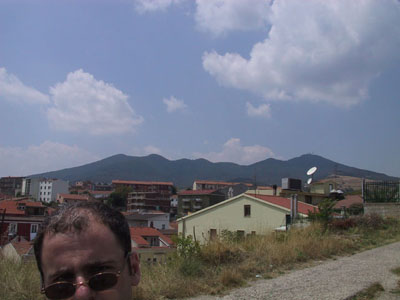
The town is situated on the slope of a gigantic, seven-peaked extinct volcano called Vulture. This geological phenom is the reason that the best wine in the region (really the best wine south of Rome) is made here. The volcanic soil and high elevation makes is the perfect environment for the late-blooming Aglianico grape. The particular local varietal, not surprisingly, is called Aglianco del Vulture and is sumptuous, a meal unto itself. Think of a Cabernet, then make it heavier and more tannic and you have Aglianico. It is not a light summer wine. In fact, it goes best if you can slay a wild boar with your bare hands and flame-roast it drenched in olive oil over a spit. When we did genealogical research in Barile in 2003 we learned that my great-great-great grandmother Carmela Paternoster, is an ancestor of Vito Paternoster, present-day owner of the Azienda Vinicola Paternoster, the premiere winery in Basilicata for the production of the Aglianico. Nice pedigree, eh?
Still, the town is rustic. I’ve been twice and never seen anyone under 30 who was not a child. Maybe this is changing as the region becomes more appealing to tourists and industry. It will be interesting to see in July. The town is known for the caves, called sassi, which line the ridge of soft rock underneath the town. Up until the 1950’s this is where most townsfolk lived. In fact, many families are still in possession of the caves, such as my “cousin” (relationship unknown) Anita Di Tolve, who like most have converted it into a wine cellar/self-storage unit.
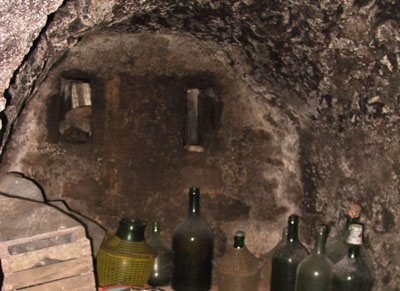
In 1993 when I was studying in Rome a buddy and I made a first trek to Barile. We were completely out of our element, barely speaking Roman Italian and arriving in the middle of siesta, but we did happen upon a man who understood us well enough to be intrigued that we were there in the first place. I can’t recall his name, but I do remember that he took us straight to his family cave. In retrospect it was probably a foolish thing to do. Two American idiots following a man they could barely understand into a dank cave to drink his homemade hooch. But we did it, the wine did not kill us, and we emerged unscathed and frankly quite pleased with ourselves. More on this first trip to Barile later.
Vulture was also the stomping ground of the young Roman poet Horace. It is a bit of a claim to fame for the area. Up near the caldera of the volcano which is now a gorgeous lake is a plaque embedded in the terrain with a stanza from his Orations where he describes lounging on the slope of the mountain.
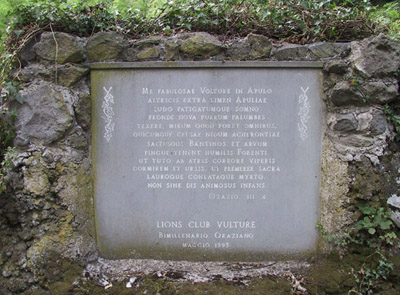
Italy calling
In 2003, my father and brother and I travelled to Barile, Italy, birthplace of my great-grandparents and the town they emigrated to the USA from 100 years before. The trip marked the beginning of my foray in blogging (on a private family site). It is also the prologue to what promises to be an amazing return trip this summer.
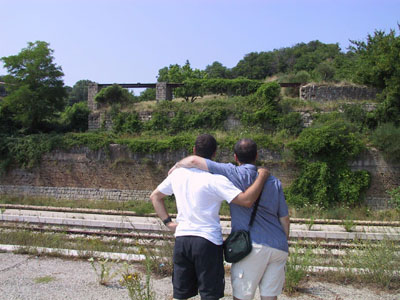
At the Barile train station
For years my family discussed our great-grandparents, Giuseppe Tolve and Grazia Botte, who had come to America. We knew little because they both died relatively young after having a bunch of children (one of whom was my grandfather), so there was no one with first-hand knowledge to ask about their roots. We came to believe that my great-grandfather himself was an orphan and that he was from a small town in southern Italy called Barile. My grandfather’s and parent’s generation was far more interested in the American dream than in mining the past — especially a past in rural, poverty-stricken southern Italy. But my siblings and cousins were curious and adamant, and as the older generation left us, my father also realized the family history that was slowly slipping away.
So we went back. And what we learned was life-changing. If you’re interested in the details, e-mail me and I will point you to the private site with a dual travelogue from my father and I. Suffice to say that many family myths were debunked, much new information was uncovered, new family we didn’t know we had were found, and a love affair with the region of Basilicata was begun. Here’s an excerpt:
Basically the rest of the day became a person-by-person, cafe-by-cafe hunt for Roberto’s cousin Anita Di Tolve. He had never met her, but he knew she lived there and that her family owned a gelateria. It was like a scavenger hunt. We’d go from place to place gathering new information. At each place word of our presence had preceded us. “Oh, Di Tolve! Yes, yes, we heard you were here.”
Finally we found her. She was in her late 70’s and wearing all black because her husband passed away last year. Once she figured out what was happening she invited all seven of us into her tiny cave-like home and started balling. It was extremely emotional. She insisted that we let her take us to her wine cave (there’s a much a longer story about why most Barilesi have caves), the local cemetery, and to cook us dinner that night. We let her do all of the above. She had to put on black stockings before we went out because if the fellow townspeople saw her without them there would be gossip. She was, after all, a recent widow.
In the cave — a good 25 degrees cooler — we sipped homemade spumante that her husband had bottled five years ago. At the cemetery we searched the above-ground tombs just like we searched the yellowing church records for evidence of Tolve, Botte, Urbano, Paternoster, and Schiro families. Anita could not get in to her father’s tomb because she and her sister were having a dispute and her sister had changed the lock. Typical Italian family bickering.
About a year ago I got an e-mail from a Michele Brucoli, part of the external communications department of the regional government of Basilicata. He had come across my infrequent postings on Barile and was interested in learning more about my perspective on his region as a descendant. We’ve stayed in touch over the past year and he’s sent me plenty of information. Basilicata is eager to promote tourism and investment and, independent of Michele, I’ve long supported this. Basilicata could easily be the next Tuscany or Amalfi Coast. The region boasts two separate coast lines (one on the Tyrrhenian Sea and one on the Ionian Sea), mountains, and dense forests. Like Sicily and Cyprus, Basilicata was a waypoint for whatever conquering empires were traversing the Mediterranean so there’s a diverse ethnic and cultural fabric that you don’t often find in Roman northern Italy. In short, I agree wholeheartedly with Michele that the region is ripe for discovery.
Recently Michele mentioned that the city government of Barile had discovered my blog, including the private diary from 2003, and that they were preparing to give me an award and a “day of celebration” this summer, if I could return. I was floored. I don’t exactly know what the award is, but I assume it has something to do with promoting the Lucani nel Mondo (or people of Basilicatan descent — also known as Lucanians — who live outside of the region). So, it looks like my family is ready to head back with me. I’m excited. Details are somewhat scarce right now, but it is obviously an experience I could not pass up. An award for being intersted in my roots! Hard to believe, really. I may even bring my five-year-old son.
As a sidenote, if you live in or near Chicago and want to get a taste of Basilicata there is actually a restaurant on the north side called Anna Maria Pasteria run by two sisters from Ripacandida, a small town near Barile in Potenza. The menu itself is fairly broadly Italian, but the place feels like the rustic kitchens of Basilicata, and if you ask Anna or Maria specifically they will cook you up real local dishes. Recently, as my father, uncle, cousin and I were leaving from dinner there, I mentioned my name to Anna. She grew up with my grandparents and extended family on the south side and seemingly knew more about them than we did. It is a small world when you are from Basilicata.
Hi, I’m John Tolva!
Mission Elapsed Time: 20:00:21:06:42:40
Recently this blog (and my Flickr account) turned 20 years old, forever in Internet years. I went back through it all, retracing digital footprints made on what feels like a different planet. Here are some highlights.
The Terror Tourist
A roughly monthly exploration of places in horror fiction — real or imagined, geographical or psychological — culled from The Heavy Leather Horror Show.
Subscribe to the podcast or the email newsletter or just read through the archives posted here.
The Ampcamper
How I hauled myself, two teens, an 80 lb dog, and a whole load of crap 4000+ miles across six states in twenty days using an electric vehicle. And survived to tell the tale.
Latest Photos
Marginalia
Stuff I’ve found interesting from around the web lately.
A Mystery in the Shape of a Book
On a gravel road outside of Cheyenne, Wyoming, I stood before a Little Free Library painted the colors of the Pride flag.
‘Everyone thought it would cause gridlock’: the highway that Seoul turned into a stream
On a crisp December morning, office workers and tourists stroll along a tree-lined stream in central Seoul, pausing on stepping stones that cross its flowing waters.
Gulf ofSomething
Take the power of MapQuest with you wherever you go. Download our mobile apps for turn-by-turn navigation, live traffic updates, and more.
The Surprising Theory That Explains Modern American Life
Why don’t you move?
The Great Resegregation
The Trump administration’s attacks on DEI are aimed at reversing the civil-rights movement. Produced by ElevenLabs and News Over Audio (Noa) using AI narration. Listen to more stories on the Noa app.
Steal My Tesla
Don't waste any more time trying to sell your Tesla. We'll take it from here... Having difficulty selling your Tesla without all the hassle and negativity? Maybe its time to consider other options.
A Memorandum from the Newly Established Department of Grammar Efficiency
The federal Government is eliminating inefficient grammar. NO ONE understands how to properly use an em-dash or semicolon. Therefore, those types of punctuation are now ELIMINATED to protect hard-working American Citizens from further confusion. YOUR WELCOME.
What does Maga-land look like? Let me show you America’s unbeautiful suburban sprawl
In 1941 Dorothy Thompson, an American journalist who reported from Germany in the lead-up to the second world war, wrote an essay for Harper’s about the personality types most likely to be attracted to Nazism, headlined “Who Goes Nazi?” “Those who haven’t anything in them to tell them what
Bad at Goodbyes
On today’s show we learn about the Casey’s Larkspur, a critically endangered perennial herb native to the Kyrenia Mountains in northern Cyprus, an island in the east of the Mediterranean sea. Please find us on the web at Bad at Goodbyes and on instagram.
Yes, Paris has its own bicycle hearse and so does the United Kingdom
In the burgeoning bicycle city of Paris, France, those looking for a more gentle, environmentally friendly funeral service now have the option of a hearse powered by a cargo bike.


